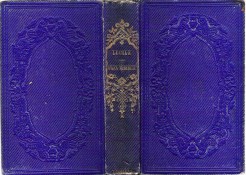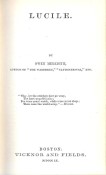Please see my "frequently asked questions" (FAQ) page before querying me about the publisher or the dollar value of an edition of Lucile (or a similar book). I'll happily respond to questions not answered there. Email address: sid-huttner@uiowa.edu
This page, and all pages at this site headed "The LUCILE Project," have been created by me, and I retain all copyrights to them individually and as a compilation. Others are welcome to link to them (acknowledgement is expected), but pages should not be copied to other sites or published in other formats without my approval.


Click on either image above to view a larger version.
This feature is available on nearly all 5000 images thus available at this site.
The Lucile project is recovering the publishing history of a single 19th century book. Owen Meredith's Lucile was first published in 1860, by Chapman & Hall in England and as a Ticknor & Fields "Blue & Gold" in the United States. In England, it saw only a handful of editions over the next 40 years. In the United States, however, it remained in print until 1938, last offered as a surviving title in Burt's Home Library remaindered to Blue Ribbon Books in 1936. It went out of print in 1938 (although multiple digital and print-on-demand (POD) editions are now not only available but, as did the reprint editions, proliferating).
The main files at this website are linked from this home page. The major link is to the list of Lucile's publishers. Each entry in that list in turn is linked to one or more pages that record information on the publisher and on all editions of Lucile known to have been produced by that firm. A detailed explanation of how to read these pages is on the FAQ page.
Since Lucile was often one title in a uniformly bound series, it is possible to use the descriptions and images reproduced at this site to identify and date other end-of-the-19th-century books. A series (or "Edition" or "Library") often included dozens, sometimes hundreds, of titles (as similar publishing efforts still do to this day: think of the Everyman's Library or Penguin Classics). This is particularly true for publishers who aimed at mass-market distribution of inexpensive (but often extravagantly illustrated or bound) editions, among them Altemus, Caldwell, Conkey, Crowell, Donohue, Hurst, Lovell, and Worthington. Buyers were invited to acquire single titles, but whole series, or a set number (10, 25, 50, etc.) of selected titles from a series, could often be purchased at a sharp discount. Lucile is also a prime example of a "gift book" as that term was understood and used from 1880 to 1915, as the linked contemporary comment explains.
During the 78 years 1860-1938, nearly 100 American publishers brought out at least 2000 editions and issues. Since many, even most, of these editions were not dated, we are matching descriptions and line drawings combed from Publishers' Trade List Annual (PTLA), 1873-1938, with 400+ copies currently held by The Book Arts Press (BAP -- the demonstration collection of Rare Book School at the University of Virginia), with (near the end of June 2021) 1423 personally-owned copies (E&SH), plus 126 editions of Meredith's Works for a total of 1549 volumes (requirng 162 linear feet of shelving). Copies reported by libraries across North America and by friends of the Project are also noted here (in captions for the enlarged version of images). The hope is to identify at least one surviving copy of each recorded edition.
Please click through the tabs on the banner at the top of this page to review quickly the resources available at this site. You may find the "Site Map" particularly useful in understanding how the site is organized -- it also now contains, near the bottom of the page, images of the collection as it is shelved and statistics on the collection and on this site. The brief history of the project may also be helpful.
Lucile has been digitized by Project Gutenberg: http://infomotions.com/etexts/gutenberg/dirs/etext99/lucil10.htm, and can be found on the internet in this and at least a dozen other downloadable digital versions (all of which appear to be based on post-1868 editions); it is also once again "in print" by several print-on-demand (POD) publishers. Searching "Owen Meredith Lucile" in Google Books will bring up a dozen or more "editions" that have been scanned and OCRed in one or another of Google's library partnerships; many of these, and others, can also be found in the HathiTrust Digital Library or the Internet Archive.
This site began as a simple list in 1985 (when the collection reached 40 copies) and has seen many iterations. The current design dates to 2010, and was greatly assisted by Linda Roth, then UIowa Libraries Webmaster, who designed the page header and templates. Consequently, all pages now feature robust navigation tools. However, the site offers no internal search tools or controlled-vocabulary metadata -- period publishers' vocabulary has been preferred and carefully recorded. A Google site-restricted search will therefore often yield interesting results. Use a search string like <site:sdrc.lib.uiowa.edu/lucile "limp ooze">, for example, to bring up a list of pages that contain this descriptive term for a suede leather popular for a few years after 1900. "Pyrogravure" is another interesting but now obsolete binding style popular in the same period, and hand-painted "celluloid" was also, briefly, experimented with.
Reports of copies of Lucile with scans or photos, particularly editions not found described in the publishers' files here, are much appreciated.
 Sid Huttner.... Emeritus Senior Librarian, Special Collections & University Archives (department Head 1999-2011), The University of Iowa Libraries, served 1993-2003 as Book Review Editor for The Guild of Book Workers Newsletter and as Book Review Editor of Rare Books & Manuscripts Librarianship (Chicago: ACRL), 1992-1998 (now retitled "RBM"). He is joint author with Elizabeth Stege Huttner of A Register of Artists, Engravers, Booksellers, Bookbinders, Printers & Publishers in New York City, 1821-1842 (New York: Bibliographical Society of America, 1993), available from Oak Knoll Books and from 2014, as a Humanities E-Book via ACLS (American Council of Learned Societies) to subscribing institutional libraries. Many of his book reviews, articles, presentations, and other professional writings can be found at BePress.com.
Sid Huttner.... Emeritus Senior Librarian, Special Collections & University Archives (department Head 1999-2011), The University of Iowa Libraries, served 1993-2003 as Book Review Editor for The Guild of Book Workers Newsletter and as Book Review Editor of Rare Books & Manuscripts Librarianship (Chicago: ACRL), 1992-1998 (now retitled "RBM"). He is joint author with Elizabeth Stege Huttner of A Register of Artists, Engravers, Booksellers, Bookbinders, Printers & Publishers in New York City, 1821-1842 (New York: Bibliographical Society of America, 1993), available from Oak Knoll Books and from 2014, as a Humanities E-Book via ACLS (American Council of Learned Societies) to subscribing institutional libraries. Many of his book reviews, articles, presentations, and other professional writings can be found at BePress.com.
Last revised: 19 June 2021